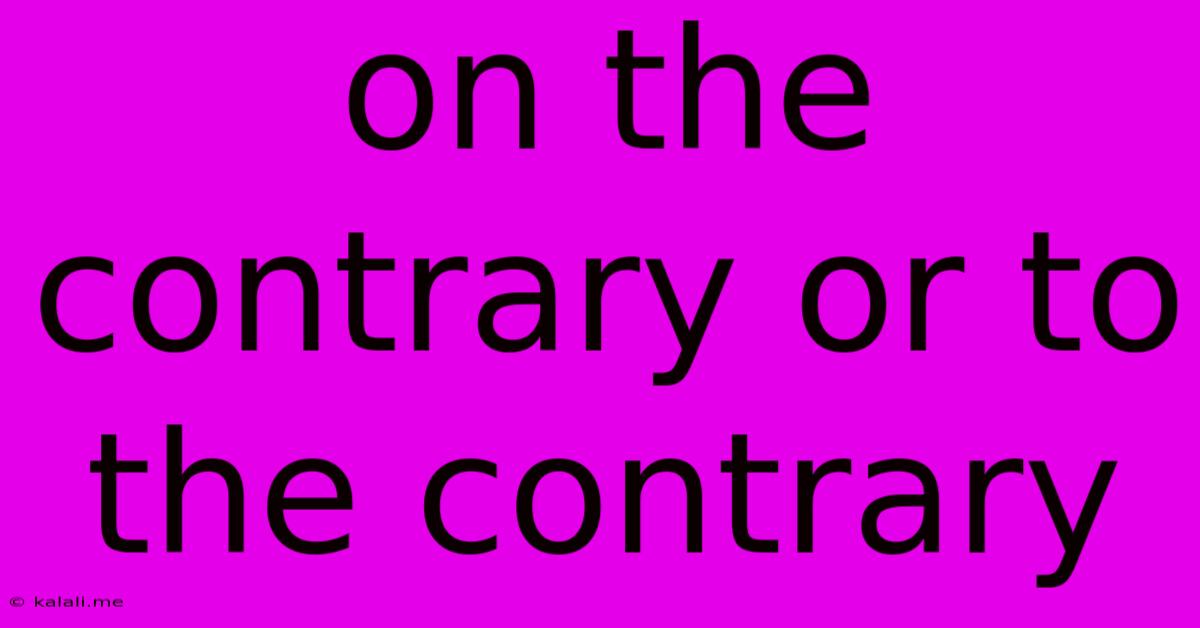On The Contrary Or To The Contrary
Kalali
Jun 03, 2025 · 3 min read

Table of Contents
On the Contrary vs. To the Contrary: Understanding the Subtle Difference
This article will delve into the nuances of "on the contrary" versus "to the contrary," exploring their meanings, usage, and the subtle yet significant differences that distinguish them. Understanding this distinction will elevate your writing precision and clarity. Choosing the correct phrase ensures your message is communicated effectively and avoids potential misinterpretations.
What does "on the contrary" mean?
"On the contrary" is used to express disagreement or opposition to a previously stated idea or assertion. It implies a complete reversal of the preceding statement. Think of it as a strong counterargument, directly refuting the prior claim. It suggests not only a difference of opinion but a direct contradiction.
Examples of "on the contrary":
- "He said the project was a success. On the contrary, it was a complete failure."
- "She believes the economy is improving. On the contrary, I think it's worsening."
- "You think this is easy? On the contrary, it's incredibly challenging."
Notice how in each case, "on the contrary" introduces a statement that directly contradicts the preceding one.
What does "to the contrary" mean?
"To the contrary" indicates that evidence or information exists that contradicts a previous statement or belief. It doesn't necessarily express a direct disagreement as strongly as "on the contrary." Instead, it introduces evidence or arguments that challenge the preceding statement. It sets the stage for presenting this counter-evidence.
Examples of "to the contrary":
- "Many believe that cats are independent. To the contrary, research shows they crave attention and social interaction."
- "The initial reports suggested a decline in sales. To the contrary, the final figures revealed a significant increase."
- "While some may argue that this approach is inefficient, there's ample evidence to the contrary."
Here, "to the contrary" introduces supporting evidence or arguments that oppose the initial claim without directly contradicting the speaker. It acts as a transition to present counter-evidence.
Key Differences Summarized:
| Feature | On the Contrary | To the Contrary |
|---|---|---|
| Meaning | Direct contradiction; complete reversal | Introduction of contradictory evidence or arguments |
| Strength | Stronger, more forceful disagreement | More neutral; presents counter-evidence |
| Usage | Directly refutes a previous statement | Presents evidence opposing a previous statement |
| Emphasis | Emphasis on the disagreement itself | Emphasis on the contradictory evidence |
Choosing the Right Phrase:
Selecting between "on the contrary" and "to the contrary" depends on the context and the desired level of assertiveness. If you want to directly and forcefully disagree, use "on the contrary." If you wish to introduce counter-evidence or arguments without being as confrontational, "to the contrary" is the better choice. Careful consideration of these nuances ensures precise and effective communication.
In Conclusion:
While both phrases relate to opposing viewpoints, their subtle differences in meaning and usage are crucial for clear communication. Understanding these nuances allows for a more refined and impactful writing style, ensuring your message resonates with precision and accuracy. Mastering the use of "on the contrary" and "to the contrary" elevates your writing to a more sophisticated level.
Latest Posts
Latest Posts
-
Why Is Mirror Modifier Not Setting To Mirror From Center
Jun 05, 2025
-
How To Loosen Lug Nuts On Tire
Jun 05, 2025
-
What Is A Spell In Magic The Gathering
Jun 05, 2025
-
Nest Thermostat Ac Fan Speed Really Slow
Jun 05, 2025
-
Fallout 4 Mark Power Armor As Owned
Jun 05, 2025
Related Post
Thank you for visiting our website which covers about On The Contrary Or To The Contrary . We hope the information provided has been useful to you. Feel free to contact us if you have any questions or need further assistance. See you next time and don't miss to bookmark.